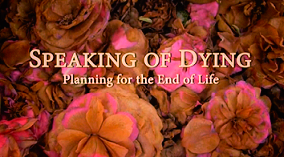End of Life
Speaking of Dying
by Trudy James

I am a graduate of Union Theological Seminary in New York City and a long-time interfaith hospital chaplain. But my most intense lessons about death, dying and grief were learned in the late 80s and early 90s when I was a pioneer in creating faith-based support teams for persons with AIDS in the South. When I moved to Seattle in 1996, I continued the AIDS work here and was a Chaplain at the Seattle Cancer Care Alliance.
When I retired from AIDS and chaplaincy in 2007, like many retirees, I got very busy! I created a small business, Heartwork, and began offering end-of-life planning workshops. These workshops led to work with a filmmaker and editor to produce a 30-minute film, Speaking of Dying. The film premiered at the Frye Art Gallery in 2015 and has been shown in over 400 churches, homes, libraries and senior living facilities locally and nationwide since then, helping many to talk more openly about their own death.
I learned from being with patients with AIDS, and with cancer, that death can be more peaceful and meaningful if it is understood, discussed and planned for long before a crisis. And yet, somehow bringing up the subject of our own death feels morbid, complicated and/or uncomfortable. If not for us, then for those with whom we’d like to discuss it. Talking about dying is the kind of discussion that’s easy to put it off “for another day.”
And because no one talks about it, it sometimes becomes difficult to even think about. One of the reasons why I’ve loved doing end-of-life planning in small 4-session workshops is that the participants get to hear stories, learn what others think, understand the resources, ask their own questions, and become more comfortable simply speaking out loud about a challenging subject. Then they can decide what they might want, talk to their physicians and family about their wishes, and
The challenges are different for each of us, because our personal experiences with death differ widely – perhaps one of our parents died when we were young; maybe a loved one suffered long with dementia, perhaps our best friend had an untimely death; maybe we lost a sibling, friend, or child to suicide. Most of us are unfamiliar with the many resources available to the dying (or grieving). Our spiritual or religious paths have varied greatly regarding death practices or what comes after death. We may be holding onto frightening images from childhood.
It is no wonder so few of us complete an advance directive! (Studies show that fewer than 30% of adults in the United States have one.) In Speaking of Dying Workshops there is time for sharing our own stories and listening to others, learning the resources, and creating our own legacy in words (an ethical will, eulogy, or obituary). Taking time to ponder our choices, decide who we would want with us or who we would want to speak for us if we could no longer speak, envisioning our own “best possible death,” writing our wishes down—these actions actually work.
Because I’ve been doing these workshops for over twelve years, I have had reports from the children of workshop participants who have died—saying how much it helped them to know their parents’ wishes. Recently a woman from an earlier workshop called to say she had been able to guide her siblings and help her mother in a distant state have a peaceful death thanks to all she had learned. I feel privileged to do this meaningful work and hope I can continue for many years.
Some resources:
